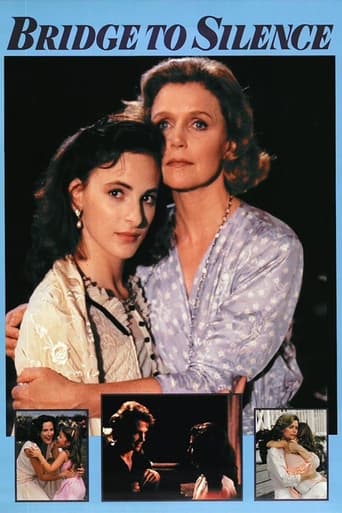Brian T. Whitlock (GOWBTW)
Losing a loved one can take its toll, but about to lose a child after the spouse does in a wreck is disheartening. John and Peg are deaf parents who have a beautiful daughter named Lisa. En route to the wife's parents, they get hit by a drunk driver. It killed the husband, and the drunk driver is killed himself. Upon recovering, Peggy(Marlee Matlin) is told the sad news about John, and she goes extremely ballistic. Toatlly in great pain, Marge Duffield(Lee Remick, 1935-91) takes her grief as a weapon, and decides to have Lisa to raise a nurture. Little does she know, she's doesn't know any sign language, and her view is very hazy about such things. Peggy really shows this closed-minded relative, that she can raise her daughter, and she is a good mother. I liked it when she really lashed out on Marge, by smacking her silly, yelling,"GET OUT! GET OUT! GET OUT!" That's showing her. Deaf people need to start making a stand, from "Children of a lesser God", now this, Maybe if Marge learned more about the deaf earlier, the relationship would have been stronger. Now it's time to truly heal. This movie is very gripping, and very emotional, I enjoyed it all the way through! 4 out of 5 stars!
petershelleyau
Marg Duffield (Lee Remick) is the Maine wife of Al (Joseph Sommer) whose daughter Peg (Marlee Matlin) is deaf. Peg's husband is killed in a car accident on the way to visit the Maine house, and the Duffield's take in Peg's six year old daughter, Lisa, while Peg recovers. Since Lisa is a speaking child, Marg thinks of her the way she wanted Peg to be, and seeks guardian custody. Remick's role is secondary to Matlin's, though she is presented as a tragic figure, particularly as Al refuses to help her plan to gain Lisa. Peg's deafness is said to be from a childhood case of spinal meningitis, and the teleplay by Louisa Burns-Bisogno, with story by Louisa and Tom Bisogno, reduces Remick to a textbook mother who is self-hating from guilt and therefore cannot love her own daughter. In a memorable scene, Peg angrily signs her exit to Marg, since Marg has refused to learn sign language, though Peg has learned to speak for her mother. The treatment uses the Tennesee Williams play, The Glass Menagerie, for therapy, to help Peg overcome her grief and also Marg `lose her unicorn horn' and embrace her daughter. Whilst Peg choosing to act in this play may seem an odd choice for someone grieving, what is more noticable is that Matlin is far too more glamourous to be believable as Laura. The Bisogno's include Michael O'Keefe as Dan, Peg's deceased husband's best friend and director of Actors Theatre for the Deaf, to offer Peg a new romantic interest, and thankfully she rebukes his protestations of love. Although his opinion may be influenced by his `crush', Dan tells Peg that being different is better than being normal, since the normal ones are as `common as weeds'. This philosophy reads as rather Nietzschean, on the level of artists not being restricted to the common moral code. Director Karen Arthur either has those signing also speaking or those signing being translated for the audience, though in one scene the sound of lapping waves drowns out the dialogue between Dan and Peg. She also gives Matlin some good moments, one being her scream of horror when she hears the news of the death of her husband, and another when she chases Remick down a flight of steps, hitting her.
Ibycus
Well, given the obvious as well as formidable scope of the film, I think everybody has contributed splendidly to express and sustain the central idea. But there is always this inescapable feature of American mentality, Wittgenstein was so fond of; I mean cinema as "wish fullfilment". Trying to look realistic in an non-realistic environment. Clash, yes, but, eventually, clash recedes and family comes to the fore. This film can do a lot of good to handicapped people. It is psychologically stimulating and possibly edifying. "But is it Art?" No, I wouldn't say so; just a decent (though mediocre) artefact, from the arch-technicians of this age. On a par with a beautifully designed motorcycle. Just one more sermon about being considerate in our exchanges with "children of a lesser God", tight-knitted family bonds being the biggest part of the solution. We had enough with this blunt-headed, simplistic, dreary and, sometimes, downright idiotic, ideology about life and love and compassion. Addressed almost exclusively to children under 10, and adding nothing to their understanding themselves, society and humanity. Protection is the key-word and it often makes me mad, because I hate hiding behind shields provided by our parents' or friends' affection. The real world, especially the American one, is a frightful place, and spears are way more numerous than shields.


